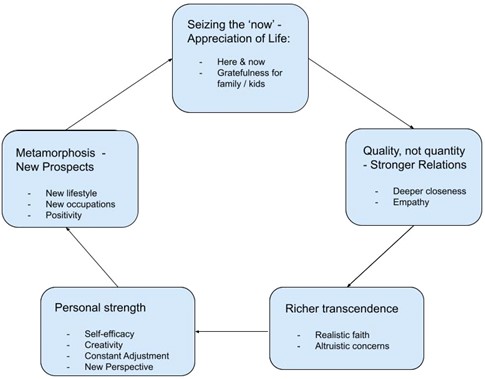Post-Traumatic Growth after Cancer: A Thematic Analysis Study
Abstract
Background: That a diagnosis of, and treatment to cancer brings along shock, distress and possible long-term negative life changes is very clear from human experience and research alike. But such an experience can also relate to positive life changes, as increasing research on the aftermath of serious illness, such as cancer diagnosis consistently shows. Observations of positive outcomes linked to quality of life are increasingly being found in cancer studies. These results seem to converge with post-traumatic growth (PTG) which emphasize positive life changes as resulting from considerable life-changing events that are borne from crises or trauma.
Objectives: Aims to this study were to 1) investigate the holistic impact and ramifications of PTG on the recovery from serious illness such as cancer; 2) clarify the relationship, if any, of PTG with mental health outcomes; and 3) how is PTG strengthened or otherwise, when one is faced by such life-changing event.
Methods: Using a Thematic Analysis design, we investigated how the diagnosis of, and treatment to cancer impacted the patients and survivors. Semi-structured interviews were conducted with people who had received treatment for breast (n=3), MSS (n=1), ovarian (n=2), bone (n=2), H. Lymphoma (n=1), Liver (n=1). Using descriptive mapping, we clarified whether this study results are consistent with Tedeschi and Calhoun’s PTG framework.
Results: Findings charted on the key factors of PTG.
Conclusions: Cancer results in varied consequences and in negative and positive adjustments. Further development of findings which charted on major PTG dimensions is warranted.
References
American Psychiatric Association. (2013). Diagnostic and statistical manual of mental disorders (5th ed: DSM-5). Washington, D.C.
Andrykowsky, M. A., Steffens, R. F., Busch, H. M., & Tucker, T. C. (2015). Lung cancer diagnosis and treatment as a traumatic stressor in DSM-IV and DSM-5: prevalence and relationship to mental health outcomes. J. Trauma Stress, 28(3), 206-213. https://doi.org/10.1002/jts.22005
Baumeister, R. F. (1991). Meanings of life. NY: Guildford Press.
Blank, T. O., & Bellizzi, K. M. (2006). After prostate cancer: predictors of well-being among long-term prostate cancer survivors, 106(10), 2128-35. https://doi.org/10.1002/cncr.21865.
Braun, V., & Clarke, V. (2006). Using thematic analysis in psychology. Qual. Res. Psychol, 3, 77-101. https://doi.org/10.1191/1478088706qp063oa
Braun, V., & Clarke, V. (2012). Thematic analysis. In H. Cooper, P. M. Camic, D. L. Long, A. T. Panter, D. Rindskopf & K. J. Sher (Eds.), APA handbook of research methods in psychology, Vol. 2. Research designs: Quantitative, qualitative, neuropsychological, and biological (pp. 57-71). American Psychological Association.
Cormio, C., Romito, F., Giotta F., & Mattioli, V. (2015). Post-traumatic growth in the Italian experience of long-term disease-free cancer survivors. Stress Heal, 31:189-196. https://doi.org/10/1002/smi.2545
Calhoun, L. G., Cann, A., Tedeschi, R. G., & McMillan, J. (2000). A correlational test of the relationship between posttraumatic growth, religion, and cognitive processing. J. Trauma. Stress, 13, 521-527. https://doi.org/10.1023/A:1007745627077
Calhoun, L. G., & Tedeschi, R. G. (2006). Handbook of Posttraumatic Growth: Research and Practice. Malwah NJ: Lawrence Erlbaum Associates.
Casellas-Grau, A., Ochoa, C., & Ruini, C. (2017). Psychological and clinical correlates of posttraumatic growth in cancer: A systematic and critical review. Psycho-Oncology, 26, 2007-2018. https://doi.org/10.1002/pon.4426.
Collier, L. (2016). Growth after trauma. APA. Retrieved from https://www.apa.org/monitor/2016/11/growth-trauma
Danhauer, S. C., Russell, G. B., Tedeschi, R. G., Jesse, M. T., Vishnevsky, T., Daley, K., et al. (2013). A longitudinal investigation of posttraumatic growth in adult patients undergoing treatment for acute leukemia. Journal of Clinical Psychological & Medical Settings, 20(1), 13-24. https://doi.org/10.1007/s10880-012-9304-5
Diehl, M., & Hay, E. L. (2013). Personality-related risk and resilience factors in coping with daily stress among adult cancer patients. Research in Human Development, 10(1), 47-69. https://doi.org/10.1080/15427609.2013.760259.
Ebright, P. R., & Lyon, B. (2002). Understanding hope and factors that enhance hope in women with breast cancer. Oncology Nursing Forum, 29(3), 561-568. https://doi.org/10.1188/02.ONF561-568
Fioretti, C., Vinciarelli, V., Faggi, D., Caligiani, L., Tessitore, F., Castelnuovo, G., & Cozzolino, M. (2022). Investigating PtG in Cancer Patients: the Role of Time Dimension in the Experience of Personal growth. International Journal of Environmental Research Public Health, 19(15), 9619. https://doi.org/10.3390/ijerph19159619
Galea, M. (2018). Predicting Post-Traumatic Growth among a sample of Maltese Tertiary Students. Psychology, 9,11. https://doi.org/10.4236/psych.2018.911146
Galea, M. (2017). Vicarious PTG after Fireworks trauma. Psychology, 1(8), 2496-2515. https://doi.org/10.4236/psych.2017.814158
Hunter-Hernández M, Costas-Muñíz R, Gany F. (2015). Missed opportunity: spirituality as a bridge to resilience in Latinos with cancer. Journal of Religion & Health, 54(6), 2367-2375. https://doi.org/10.1007/s10943-015-0020-y
Mulligan, E. A., Wachen, J. S., Naik, A. D., Gosian, J., & Moye, J. (2014). Cancer as a criterion a traumatic stressor for veterans: prevalence and correlates. Psychological Trauma, 6(Suppl 1), S73-S81. https://doi.org/10.1037/a0033721
Menger, F., Halim, N. A. M., Rimmer, B., & Sharp, L. (2021). Post-traumatic growth after cancer: a scoping review of qualitative research. Supportive Care in Cancer, 29, 7013-7027. https://doi.org/10.1007/s00520-021-06253-2
Park, C. L., Edmondson, D., Fenster, J. R., & Blank, T. O. (2008). Meaning making and psychological adjustment following cancer: the mediating roles of growth, life meaning, and restored just-world beliefs. Journal of Consulting Clinical Psychology, 75(6), 863-75. https://doi.org/10.1037/a0013348
Seiler, A., & Jenewein, J. (2019). Resilience in Cancer Patients. Frontiers in Psychiatry. https://doi.org/10.3389/fpsyt.2019.00208
Smith, M.Y., Redd, W. H., Peyser, C., & Vogl, D. (1999). Post-traumatic stress disorder in cancer: A review. Psycho-Oncology, 8, 521-537. https://doi.org/10.1002/(SICI)1099-1611(199911/12)8:6<521::AID-PON423>3.0.CO;2-X.
Sumalla, E. C., Ochoa, C., & Blanco, I. (2009). Posttraumatic growth in cancer: Reality or illusion? Clinical Psychological Review, 29, 24-33. https://doi.org/10.1016/j.cpr.2008.09.006.
Tagade, M. M., Fredrickson, B. I., & Burrett, L. E. (2004). Psychological resilience and positive emotional granularity: examining the benefits of positive emotions on coping and health. Journal of Personality, 72(6), 1161-1190. https://doi.org/10.1111/j.1467.2004.00294.x
Tagay, S., Senf, W., Schopper, N., Mewes, R., Bockisch, A., & Gorges, R., (2007). Protective factors for anxiety and depression in thyroid cancer patients. Z. Psychosom Med Psychother, 53(1), 62-74. https://doi.org/10.13109/zptm.2007.53.1.62
Tedeschi, R. G., & Calhoun, L. G. (2004). Posttraumatic growth: conceptual foundations and empirical evidence. Psychological Inquiry, 15(1), 1-18. https://doi.org/10.1207/ s15327965pli1501_01 138.
Tedeschi, R. G., & Calhoun, L. G. (1995). Trauma and transformation: growing in the aftermath of suffering. http://sk.sagepub.com/books/trauma-and-transformation
Tedeschi, R. G., & Calhoun L. G. (1996). The Posttraumatic Growth Inventory: Measuring the positive legacy of trauma. J. Trauma. Stress, 9, 455-471. https://doi.org/10.1002/jts.2490090305
Tehrani, N. (2004). Workplace Trauma: Concepts, Assessments & Interventions. Routledge
Turner-Sack, A. M., Menna, R., Setchell, S. R., Mann, C., & Cataudella, D. (2012). Posttraumatic growth, coping strategies, and psychologist distress in adolescent survivors of cancer. J. Pediatr Oncol Nursing, 20(2), 70-79. https://doi.org/ 10.1177/1043454212439472
Vartak J. (2015). The role of hope and social support on resilience in cancer patients. Indian J. Ment Health, 2(1), 35-42. https://doi.org/10.30877/IJMH. 2.1.2015.35-42
Wink, P. (1999). Addressing end-of-life issues: Spirituality and inner life. Generations Spring, 23(1), 75-81.
World Cancer Research Fund. (2018). The cancer jigsaw. Retrieved from https://www.wcrf-uk.org/uk/our-research/our-continuous-update-project.
Wu, X., Wang, J., Cofie, R., Kaminga, A.C., & Liu, A. (2016). Prevalence of posttraumatic stress disorder among breast cancer patients: a meta-analysis. Iran J. Public Health, 45(12), 1533-1544. PMC520709
Yesilot, S. B., Oztunc, B. G., Demirci, P. Y., Manav, A. I., & Paydas, S. (2017). The evaluation of hopelessness and perceived social support level in patients with lung cancer. Int. J. Health life Sci., 3(2), 88-105. https://doi.org/10.20319/lrjhls.2017.32.88105


This work is licensed under a Creative Commons Attribution 4.0 International License.
Copyright for this article is retained by the author(s), with first publication rights granted to the journal.
This is an open-access article distributed under the terms and conditions of the Creative Commons Attribution license (http://creativecommons.org/licenses/by/4.0/).









1.png)














